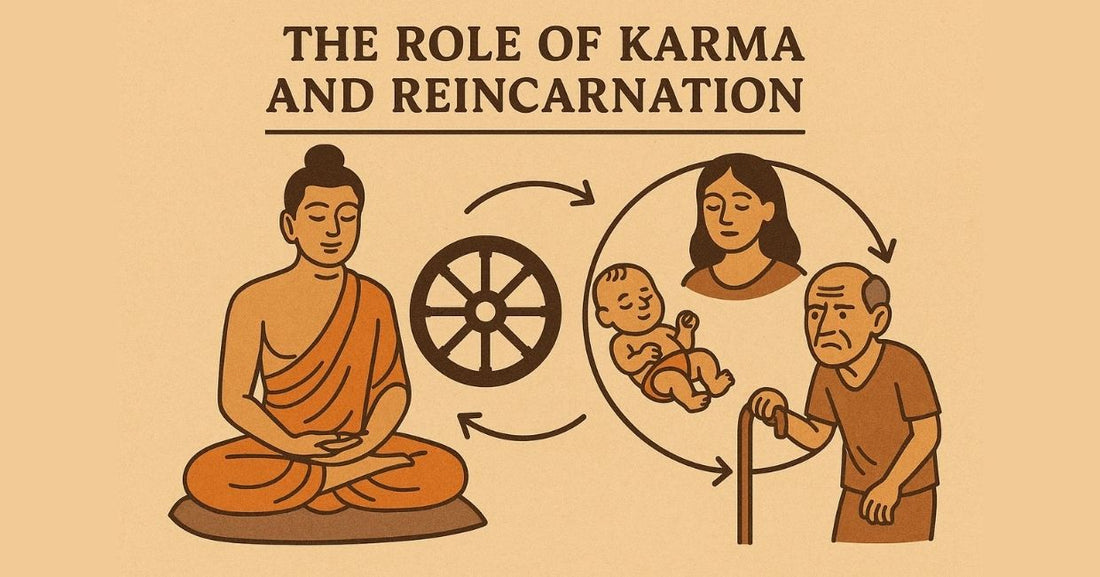
The Role of Karma and Reincarnation
Sanatan Dharma, one of the world's oldest spiritual traditions, is deeply rooted in Karma, meaning our actions and their consequences and Reincarnation, the cycle of birth and rebirth, known as Samsara. These intertwined concepts offer deep insights into the soul's journey across multiple lifetimes and explain the ethical and spiritual dimensions of human actions.
Understanding Karma – The Law of Cause and Effect
Karma is derived from the Sanskrit root 'Kri' meaning "to do" or "action," It is the universal Hindu law of cause and effect which holds a person responsible for their actions and effects. This cosmic law originated in the Rig Veda. It signifies that every action—physical, mental, or emotional—has consequences. Hindu scriptures categorize karma into three types:
-
Sanchita Karma – The accumulated karma from past lives.
-
Prarabdha Karma – The portion of past karma influencing the present life.
-
Kriyamana Karma – The actions performed in the present, shaping the future
-
Agami Karma – This is future karma resulting from the present action and choices.
The concept of karma is deeply embedded in Sanatana philosophy and the foundation of Hindu social structures. In the Bhagavad Gita, particularly in Chapter 3, known as "Karma Yoga" or the "Path of Selfless Service," Lord Krishna emphasizes that nobody can remain without action, even for a moment. He distinguishes between actions that lead to bondage and those that lead to liberation. Sri Krishna highlights that performing duties without attachment to rewards leads to ultimate freedom.
He says, “Karmanye vadhikaraste ma phaleshu kadachana.” (Srimad Bhagavad Gita: 2.47). You have a right to perform your act or duty, but not to the fruits of your actions.
Impact on Life
Understanding Karma encourages individuals to act ethically and accept life’s challenges as consequences of past deeds. It teaches them to be responsible, stay strong, and focus on performing righteous actions without attachment to outcomes.
Reincarnation – The Journey of the Soul
Reincarnation, or "punarjanma" in Sanskrit, is the continuous cycle of birth, death, and rebirth. The person’s soul (Atman), being eternal and immortal, takes many births on its path to liberation (Moksha).
Impact on Life
The doctrine of Reincarnation teaches that life is not limited to a single existence. This encourages self-improvement, spiritual discipline, and detachment from material possessions, knowing that the soul’s journey is continuous.
Interconnection Between Karma and Reincarnation
A person’s actions (Karma ) directly influence the cycle of reincarnation. They determine the nature of future births, whether they will be born in a higher spiritual realm or undergo hardships to make up for past misdeeds. Human birth is considered the highest and rarest form, providing a jiva (embodied self) with the opportunity to worship God and achieve moksha, thus freeing itself from the cycle of births and deaths and merging with the Brahman. This makes human existence particularly precious in the spiritual journey.
Escaping the Vicious Cycle
The understanding of Karma and Reincarnation individuals to maintain spiritual awareness and virtuous living, as their current actions influence their future births. It fosters mindfulness, righteous conduct, and devotion. The Mundaka Upanishad mentions, ‘Brahmavid Brahmaiva Bhavati’ (The One who realizes Brahman becomes one with Brahman.)



Comments
No comments yet. Be the first to share your thoughts.
Leave a comment